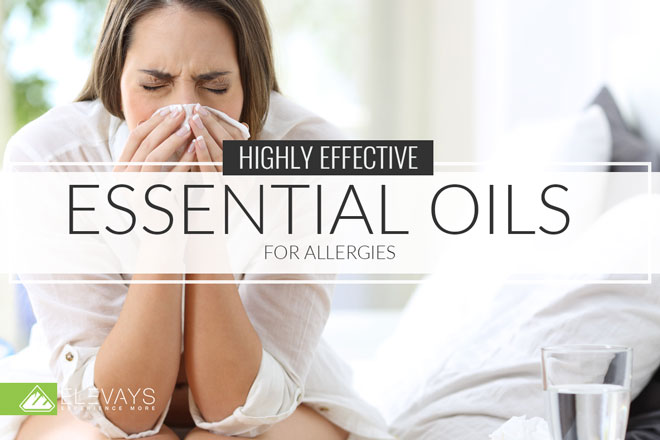Finally. The sun is out, the air has warmed, and you’re ready to be outside without bundling into a parka or hoodie. But wait — is that a sneeze coming on? And just like that, it’s time to go back in to escape the pollen. AllerGEEZ, amiright? (Sorry, I couldn’t resist.)
For many, seasonal allergies are a crippling problem. They’re more than just disruptive; they can be a serious issue for those who are asthmatic or inclined to sinus infections.
And, of course, there’s the frustration of not being able to enjoy the sights, sounds, and scents of spring! So how can you keep seasonal allergies from ruining the outdoors for you?
There’s no need to despair — there are a number of natural remedies that can help you in your battle against pollen. This is why this post is all about essential oils for allergies. First we’re going to cover a little background on allergies and what causes them and then we’ll explore some of the best essential oils for allergies.
Ready? Let’s dive in!
The Why of Allergies
We all know that allergies are caused by pollen in the air, but how does pollen induce all that coughing, sneezing, and congestion?
It all comes back to your unique immune system. If you’re allergic to pollen or mold, your body identifies these particles as foreign, harmful invaders and starts treating it as it would a cold or virus — which means lots of mucus to trap and rid the body of these particles. Fun, right? So if it’s spring or fall and you start experiencing runny nose, watery eyes, congestion, coughing, or itching, then you may very well have a pollen allergy.
Many people mistake allergies for a cold (and vice versa), but there are a few ways to tell the difference: a virus occasionally will be accompanied by fever and aches or chills, whereas allergies don’t cause these symptoms. Additionally, a virus will only last 5-10 days, but allergies can last a period of weeks.
Now, allergies may come and go as the season progresses — it all depends on what plants are blooming and how much pollen they produce. Weather can also play a part in how much pollen is in the air and how far it travels. Rain usually dampens the pollen and prevents it from saturating the air, whereas hot, dry, windy weather is an ideal breeding ground for dust and allergens.
Many individuals who suffer from seasonal allergies try to mitigate the effects by keeping windows closed and air conditioners running, and showering at night to wash any pollen out of their hair before sleeping. While these tactics can certainly help diminish residual pollen, most people end up needing something more to help them cope.
Conventional Go-To Remedies
The most common over-the-counter medications for allergies are antihistamine and pseudoephedrine (or decongestant). Some people take one or the other or a combination of both. Antihistamine helps clear up the itching, sneezing, and runny nose while the decongestant helps clear blocked up sinuses.
However, these are not always ideal for consistent use, since antihistamine use can cause drowsiness or moodiness, making it even more difficult to function during the day!
Pseudoephedrine is a stimulant, and thus it has the tendency to make people feel restless, agitated or edgy, which can be just as distracting. Not to mention, both of these drugs can be dangerous to people with high blood pressure or other health issues.
Some people turn to steroid nasal sprays to help cope with their seasonal allergies, yet these aren’t immune from problems either. Nasal sprays can cause headaches or throat irritation, and excessive use can even cause you to experience more congestion due to the fact that they shrink the nasal passages.
And still another commonly used remedy is the allergy shot, which can be administered by a doctor. Most side effects from allergy shots are pretty minimal — sneezing, itchy eyes, redness at the injection site, and so forth. However, in a few cases these shots have caused anaphylaxis, a severe allergic reaction that can be fatal. And, of course, there’s always the downside of the chemical content of these shots, which can contain high levels of aluminum and preservatives that can be incredibly toxic to the body.
As you can see, there are a number of drawbacks to the use of conventional allergy medications. This is why we love to use essential oils for allergies. They are incredibly effective at clearing your sinuses and preventing pollen reactions — without any annoying and potentially harmful side effects!
The Natural Way: Using Essential Oils for Seasonal Allergies
For most people, it’s easier to reach for an over-the-counter medication when they’re suffering from allergies. Usually this is simply because using essential oils for seasonal allergies may have never crossed their mind. But putting chemicals and toxic ingredients into your body for any extended period of time is bound to have negative long-term effects.
When you choose to use essential oils for allergies, instead of conventional medicine, you can potentially decrease the wear and tear on your body, while boosting your body’s natural defenses and increasing your overall health.
Oh – and the icing on the cake? You knock down the allergy symptoms, too! This is hands down a better deal! If you’ve been following us for a while, you know we’re big on essential oils. It’s kind of our thing! They just have so many uses and are so beneficial for your body. But how can an oil reduce your seasonal allergies?
As it turns out, using essential oils for allergies makes a lot of sense. Many essential oils have properties that are anti-inflammatory, expectorant, or immune-boosting (or some combination of these), all of which help lessen the respiratory distress that one tends to have during allergy season. And, their ability to kill bacteria can also decrease your body’s reactions to mold and other irritants!
Now let’s discuss how to use essential oils for allergies, as there are a variety of ways they can be used.
- Aromatically: One of the best ways to use essential oils for allergies is to inhale them! This is probably your first thought when discussing essential oils and respiratory issues anyway. You can inhale essential oil straight from the bottle or in the palm of your hands. But to get the best benefits aromatically, a diffuser is indeed the way to go.
Diffusers mist essential oil and water into the air so that as you breathe, the oils can open your airways, clearing your sinuses and respiratory system. We also love that when you diffuse essential oils for allergies it’s a passive activity – you can diffuse while you’re working, playing with kids or even driving (hello, car diffuser!). No hands on required and you still get the benefits of the essential oil over an extended period of time.
- Topical: Another way to use essential oils for allergies is to use them topically. Mix the essential oil with a carrier oil like fractionated coconut oil and rub the mixture into your chest to promote clear airways and easy breathing.
- Spray bottle: Another way of getting essential oils into the air is to use a spray bottle to mist diluted oils around the house. You can spray into the air, or even use on surfaces and furniture to decrease the presence of allergens.
- Bath time: One relaxing way to use essential oils for allergies is to include them in an evening bath. Simply mix a few drops of your chosen oil or blend into warm bath water, and soak in the vapors and steam. It’s almost as good as a spa day — and it will do your sinuses wonders to boot!
- Ingest: Now, you want to exercise caution when ingesting essential oils, but certain oils may be mixed with food and taken internally (such as in the case of basil oil, as we’ll discuss later). This is especially effective for the immune-boosting oils, as they work their magic from the inside out.
With so many options for how to use essential oils for allergies, you may be a little overwhelmed. But never fear — we’re now ready to dig into the best essential oils for allergies and best methods for using each one.
The Top 8 Essential Oils for Allergies
Ok, it’s not really a countdown, since they’re in no particular order, but here are what we consider the top 7 essential oils for allergies. We’ll also detail their benefits, so you’ll know exactly which oils will work best for your situation — and even give you ideas for making your own essential oil blend for allergies if you’re into DIY. Let’s take a look!
Peppermint Oil
Peppermint is one of the best essential oils for allergies. Any surprise there? Probably not — after all, the pungent, spicy scent of peppermint is often used to clear sinuses! The powerful sinus-clearing action is known as an expectorant effect, which loosens phlegm and unclogs respiratory pathways. It’s even helpful for colds, as it relieves congestion and coughing.
Peppermint oil is also anti-inflammatory, and since allergies cause inflammation of the sinuses, it’s the perfect choice to help calm your body’s allergic reaction and relieve your symptoms.
To use: Peppermint oil can be used in several different ways to diminish seasonal allergies. Try diffusing a few drops in your diffuser to send the vapor into the air and open your respiratory passageways. You can also ingest peppermint oil safely, but only use one to two drops at a time. It may be mixed with water, or added to your favorite hot or cold beverage.
You may also apply peppermint oil directly to your chest or back, just be sure to mix with a carrier oil first, since Peppermint can be sensitizing to the skin.
Lavender Oil
Is there anything that lavender oil can’t do? It’s calming, soothing, and can be used for so many different purposes that we can’t even name them all here. So for now we’ll just stick to talking about its uses for seasonal allergies. We all know about lavender’s soothing effects, and it’s precisely this aspect that makes it one of the top essential oils for allergies.
Lavender oil happens to be a natural antihistamine, giving it the ability to clear your respiratory passages and ease those excruciating allergy symptoms.
Additionally, it’s an anti-inflammatory, and strengthens your immune system against allergies to keep you healthier during these pollen-infested seasons. And if that wasn’t enough, lavender is also great for soothing rashes, so if your seasonal allergies tend to affect your skin, lavender oil may be the best choice for you.
To use: If you’re using lavender to treat respiratory symptoms, place a few drops into your diffuser and allow it to clear your nasal passages. Lavender oil can also be mixed with a carrier oil and applied directly to your skin if you’re dealing with hives or a rash, or apply to your cheeks or the areas near your sinuses for additional sinus relief.
Tea Tree Oil
This oil is incredibly potent, and is hugely beneficial when it comes to eliminating airborne molds and other pathogens. Tea tree oil is an antiseptic, so it is also useful for cleaning surfaces in the home to rid them of irritants and pathogens which can aggravate allergies even more!
To use: Since it is mostly useful for purifying and destroying bacteria, diffuse tea tree oil into the air to kill airborne pathogens, and dilute some in a spray bottle to clean surfaces around the house. The fewer pathogens and pollutants you have in your home, the more easily you can keep allergic reactions under control!
Lemon Oil or Cilantro
Both of these oils support detoxification and keep your lymphatic system running smoothly, helping prevent inflammation and illness. Allergies can be a side effect of too much toxic load on the liver – a key organ for detoxification. When there’s too much of a toxic burden on the liver it can show up in allergic reactions, including seasonal allergies.
To keep your detox pathways running like a well oiled machine, try adding some lemon or cilantro essential oil to your regimen. Both of these oils support immune system function, clear detox pathways and purify the air.
To use: Both oils can be ingested, and in fact this is a great way to boost your immune system and flush toxins from your body. Just add 1-2 drops into a glass of water or take the oils in a veggie capsule. To kill allergens in your home, diffuse and/or spray surfaces with a spray bottle. These are hands down, two of the best essential oils for allergies that you’ll find!
Frankincense Oil
This essential oil for allergies is another expectorant, so it gives respiratory relief when you’re struggling with seasonal symptoms. But like so many others on our list, it also has antiseptic and anti-inflammatory effects, making it helpful for keeping inflammation in your body at a minimum and clearing bacteria from your home.
Frankincense also works powerfully for cell regeneration. Since cells basically run the entire human body, anything that we can do to promote health at the cellular level is important and beneficial. This is just one of the reasons why Frankincense is one of the top essential oils for allergies.
To use: Frankincense is a very mild essential oil and blends well with Lavender. Try add a few drops of Frankincense and Lavender to a carrier oil, like fractionated coconut oil, and massage into the chest. You can also diffuse with Lavender to keep your sinuses clear and the air pathogen-free. A recent study found that this oil can be especially beneficial for asthmatics, so if you struggle with asthma that is triggered by seasonal allergies, then frankincense oil may be able to help.
Eucalyptus Oil
Eucalyptus is another oil that has a “cooling” sensation, much the same as peppermint oil. This, combined with its natural anti-microbial properties make it a powerful and versatile essential oil for allergies.
Eucalyptus oil promotes clear airways, gets rid of phlegm, and, of course, kills those nasty pathogens that are the root of the problem. It’s truly a powerhouse oil for dealing with the effects of seasonal allergies!
To use: Like the others, eucalyptus oil may be diffused into the air to kill airborne pathogens, mold spores, and any other bacteria that can cause your allergies to flare up. But it may also be combined with peppermint oil and coconut oil as a homemade vapor rub to help clear congestion. Add a couple drops of peppermint and eucalyptus to your carrier coconut oil, then simply rub on your chest to breathe easier.
Since eucalyptus is also a de-greaser, you can add it to a saltwater rinse and gargle with it to clear your throat. This is an incredibly handy trick when your throat is phlegmy from drainage!
Basil Oil
Basil oil has some unique properties that make it one of the top essential oils for allergies. We discussed earlier that the main problem with seasonal allergies is in the body’s response — it overreacts to the particles in the air, which is what causes all the mucus, itching, and other irritation. Basil oil’s power comes not only in dealing with the symptoms, but in dealing with how the body responds to allergens.
Basil oil supports the adrenal system, which helps your body to respond appropriately to allergens and keeps your system from overreacting. In addition, it detoxifies the body and reduces inflammation and pain.
These characteristics make it uniquely beneficial in fighting the source of allergic reaction from the inside out.
To use: Since basil oil is derived from the tasty herb, it can easily be ingested to gain its effects. You can cook with this oil by adding a very small amount to soups, pasta sauce, or pretty much any dish and enjoy. To get a small amount, open the essential oil bottle and insert a toothpick. Swirl the toothpick in the dish and repeat to get the desired flavor intensity. Or, it can be diluted with coconut oil to create a respiratory rub for your chest or neck.
Facing the Allergy Season Head-On
You may have felt (or feel!) completely at the mercy of your seasonal allergies. Because it stinks to be surrounded by beautiful weather and not feel like you can enjoy it! I encourage you to turn to one or more of the essential oils for allergies that we discussed in this article so you no longer have to suffer through the season, or keep taking conventional medications with their troublesome side effects.
When you use essential oils for seasonal allergies, it can help you face the great outdoors without fear, and with minimal symptoms. Try your hand at creating your own essential oil blend for allergies — for example, whip up a blend of eucalyptus and lavender in a diffuser to kill airborne pathogens and simultaneously soothe your sinuses. The possibilities are endless, and you can create powerful blends that will keep you and your family comfortable and able to actually enjoy the spring and summer seasons.
Do you suffer from seasonal allergies? If so, have you ever tried using essential oils for allergies? What are your favorite ones for clearing away those pesky symptoms? Sound off below! We’d love to hear from you!









Do you have any blends for allergies in an diffuser?
Thank you
Hi, thank you for reaching out! In this article (https://elevays.com/essential-oils-for-allergies-2/), you’ll find some suggestions for diffusing the best oil for allergies!
As far as blends go, choose the oils from this list that you most love the aroma – and get creative with it! 2 drops of both lavender and peppermint can be great. You can even add other oils with lavender and peppermint there that aren’t specifically for allergies like chamomile and lemon for a lovely blend. Hope this helps!